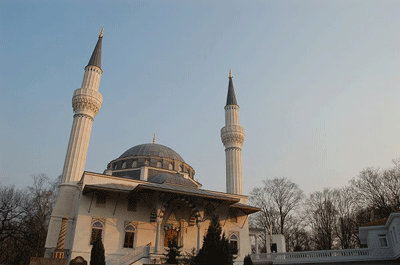
Educating Imams in Germany: the Battle for a European Islam
By Paul Hockenos, The Chronicle Review, July 18, 2010
Berlin
In the snow-swept courtyard of the white-marble Sehitlik Mosque, Berlin’s largest Islamic prayer house, the resident imam greets the faithful with handshakes and embraces. A slightly built, cordial man wearing an open parka, Mustafa Aydin is a Turkish civil servant on a four-year posting abroad, as are many of the Islamic preachers in Germany, where the Muslim community is overwhelmingly of Turkish heritage. Aydin understands basic German, which he’s been learning, but he communicates with me through a Turkish-to-German interpreter. The services’ prayers are in Arabic, he says, but his sermons and chats with congregants—including those born and schooled in Germany—are in the language of their parents’ Turkish homeland, and that, he assures me, is perfectly adequate for his parish’s needs. “We don’t have any problems with Turkish,” he says.
In a Germany struggling to come to grips with its burgeoning, four-million-strong Muslim population (about 5 percent of the populace), the use of imams sent from Turkey and other foreign countries, including Saudi Arabia, has come under sustained fire from integration-minded critics. After all, argue some intellectuals, politicos, and other citizens across Germany’s political spectrum, including the more moderate currents in the Muslim community, how can the foreign clergy advise believers—many of whom grapple with profound disadvantage in Germany—without mastering the lingua franca and knowing the world they live in? The imams have, in part, been held responsible for Muslims’ ghettoization, as well as fundamentalism in some pockets of the country.
“The problem isn’t these imams, it’s that there aren’t any other imams,” responds Badr Mohammed, a Lebanese-born social worker and city politician who offered to show me around the Sehitlik Mosque, in one of Berlin’s heavily migrant neighborhoods. “We’re only now laying the foundations for a new model,” he explains. “In order to facilitate the integration of Muslims, we have to first integrate the imams, and this requires another generation of imams, German imams, which we don’t have yet.”
Fostering a generation of German-schooled imams, seen as central to breaking the vicious circle of Muslim exclusion, is the chief aim of an Islamic-theology initiative announced by the government in January. The effort is a vital front of the Islam Conference, started in 2006, an ambitious, wide-ranging process set in motion by the German government to consider the yawning gap between mainstream Germany and its Muslims. The conference, designed to map out a long-term integration strategy, painted a dismal picture of the reality faced by German Muslims. It is a reality marked by meager integration; growing alienation and even fundamentalism among the second and third-generations; the ossification of a Muslim underclass; and dysfunctional communication between Germany and its Muslims, nearly half of whom are German citizens. One of its key recommendations is to focus on the training of the Islamic community’s personnel, including religion teachers, as well as the dearth of Islamic theology in German academe.
Bringing Islam into the classrooms at the very highest level, Germany hopes, will have an educational and cultural trickle-down effect. And so the country’s foremost academic advisory body, the German Council of Science and Humanities, announced the creation of cutting-edge academic institutes—hybrids of seminary and religious-studies programs—to examine Islamic theology with a critical bent and teach it to Germany’s Muslims in a university setting. “This,” stated the council’s 158-page report, “is the best way to insure the academic quality of research and instruction, to intensify the discourse with other disciplines with different worldviews, and to create a reliable theological foundation for interreligious dialogue.”
Although the institutes will be anchored in state-financed colleges, the country’s Muslim communities will have a substantial voice in their curricula and management, just as Christian churches do in theology departments across Germany. The council’s recommendations are not blueprints for the two or three new planned institutes, estimated to open in 2012 and to cost about $4-million annually in government funds, but rather a visionary démarche, the specifics of which—the study program, size, and composition of faculty and students—will be hammered out by the vested parties over the next few years. Certain, however, is that these new academies will nurture not only German-speaking imams with European orientations, but also—if everything goes according to plan—new ranks of male and female Muslim religion teachers, public intellectuals, scholars, and faith-based social workers. The long-anticipated proposal explicitly mentions the training of qualified religion teachers for the estimated 700,000 Muslim pupils in Germany who do not enjoy faith-based religious instruction on a par with that of their peers who belong to the major Christian denominations.
The initiative is part of a broader strategy to promote a European Islam in Germany—and across the continent—that better reflects the needs and values of the European Union’s 16 million Muslims, and breaks new ground in the cultivation of a moderate, Enlightenment-friendly Islamic faith. The establishment of faculties of Islamic theology “could change the very character of Islam in Germany and Europe,” says Christoph Markschies, president of the prestigious Humboldt University of Berlin.
For the entire article, click here.